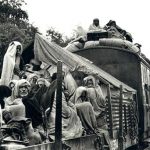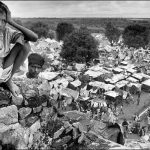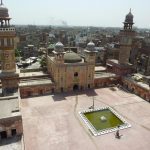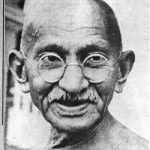Interviewed by Amber Abbas
D-25, Oxford Apartment, Patpar Ganj, New Delhi (November 5, 2009)
Transcript:
Context Notes: During our interview Professor Amin was suffering from allergies and his nose was running constantly. He also had several attacks of sneezing. But he was patient and generous enough to continue speaking with me despite it all.
Professor Mohammad Amin: Going back to what we were talking about Aligarh. At that time, there was a euphoria that Aligarh was so powerful, that it will decide the destiny of the country and the partition of the country and whatnot. And people were carried away. It is a fact that if the meeting was called in the Union, and the bell rang here, shops in Hattras used to get closed. Aligarh mein ho raha hain, Aligarh mein ho raha hain. (Something is happening in Aligarh, something is happening in Aligarh) Pir, ooske bad, kya hogaya?Ooske bad, yeh ho gaya ke (Then what happened? What happened then was–) everywhere people were afraid for their life because it was rumored that people were going to attack Aligarh.
AA: Before partition or after?
MA: (0:05:31.5) After partition. After partition.
MA: (0:05:53.8) We were instructed to carry a book or something like that. And in the book, write the name Mahavir Prasad or Raghav Lal or something or the other. (laughs)
AA: Were you frightened?
MA: Anybody would be frightened! Because there were cases where people were being thrown out of the train. And killing them. Because, after all, there was that, kya nam hain (what do you call it?) spell of madness all over the country. And when people were coming from the other side, compartments full of dead bodies of Sikhs and Hindus. And here, this was going on on mass scale. I mean, I think one thing that tells you most is the assassination of Mahatma Gandhi. I was present at Aligarh at that time. We were going to kya nam hain, the shaher (city). [When we reached there] Tho, is vakt jo hein, log bata rahein the “Vapis jao! Vapis jao!” Vahan se ho gaya tab thak avaz har jagey hein, “Mahatma Gandhi ko katal kar diya gaya, mar diya gaya, Godse ne, Hindu ne mara, Hindu ne mara, Hindu ne mara! Ek Hindu, pagal, oos ne, kya nam, mara!” (By this time, people were telling us, “Go back! Go back!” from there. By that time the sound was coming from everywhere, “Mahatma Gandhi has been murdered, has been killed by Godse. A Hindu killed him, a Hindu killed him, a Hindu killed him! A Hindu, a madman, he killed him!”)
Radio also kept on, every five minutes, repeating it. So that was a time. And then before that, leading to that, when the riots were in Delhi, you had Mahatma Gandhi had gone on a fast to the death. And he refused to take anything “Aisa nehin, aap kijiye, you, all the people, Sikhs, Hindus and Muslims, they should come hand-in-hand to me and pledge that they will stop this.”



